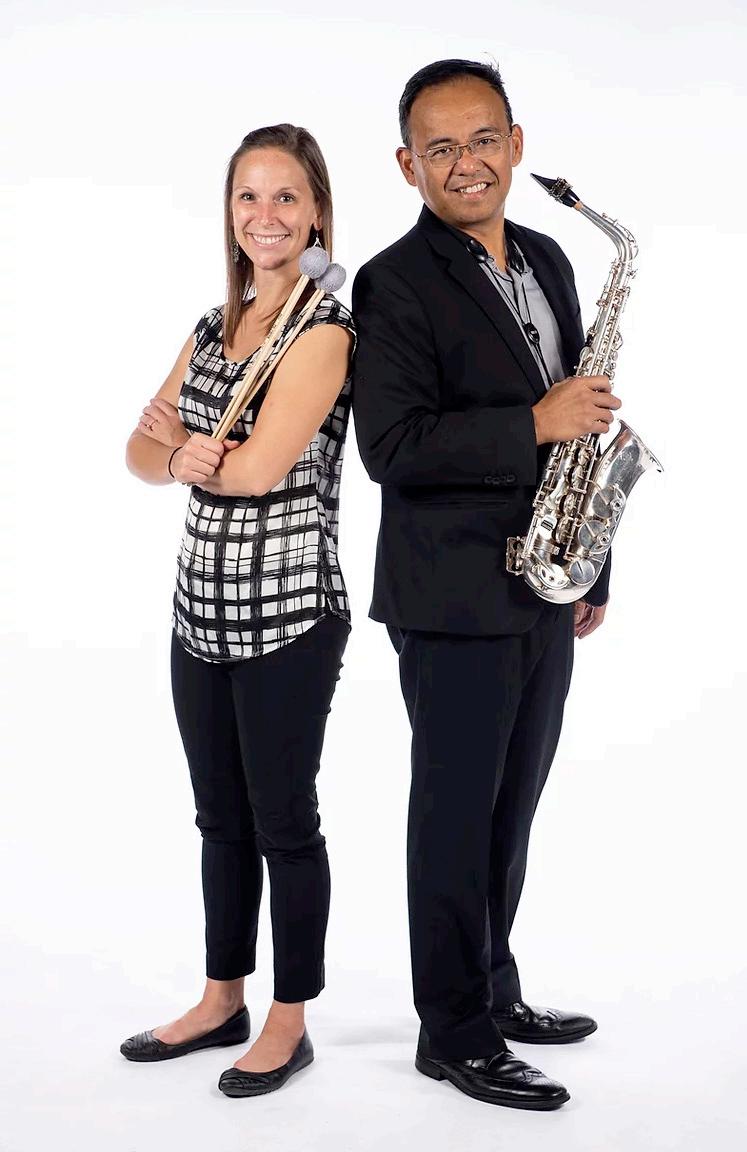

DRAX: CHAOS+CONTEMPLATION
New electroacoustic works for saxophone and percussion
Megan Arns, percussion
Leo Saguiguit, saxophone
PROGRAM:
We Don’t Have Enough Time (2017)
Steven Snowden
Where Are Our Mothers (2017)
Steven Snowden
They Tried to Bury Us, They Didn’t Know We Were Seeds (2015)
José G. Martínez
Breathe (2016)
Evan Williams
Soledad (2018)
Carolina Heredia
I. Lamenting
II. Triumphant
NOTES:
We Don’t Have Enough Time, Where Are Our Mothers
The two works by Steven Snowden (We Don’t Have Enough Time and Where Are Our Mothers) were written in the wake of the presidential election, reacting to the ways Americans receive information and news via social media. Citizens must distinguish between what is true and what is propaganda. These works represent two very different personal reactions: the first navigates anger, confusion, and absurdity amidst information overload, while the second seeks to reconcile feelings of inner turmoil through quiet self-reflection. Though resolution and understanding are sought in both approaches, more questions than answers are raised, and truth is further obfuscated rather than illuminated. Snowden sums up his work through the following quote from Criss Jamie’s book, Venus in Arms (2012):
In the age of technology there is constant access to vast amounts of information. The basket overflows; people get overwhelmed; the eye of the storm is not so much what goes on in the world, it is the confusion of how to think, feel, digest, and react to what goes on.
Writing music for dance, theater, multimedia installations, and the concert stage, Snowden’s work often focuses on United States history and how past events relate to modern society. While his musical influences are deeply rooted in bluegrass, folk, and rock, he utilizes nontraditional techniques and processes to compose works that do not squarely align with any single genre or style. He currently works as a freelance composer in Boston.
They Tried to Bury Us, They Didn’t Know We Were Seeds
The title of They Tried to Bury Us, They Didn’t Know We Were Seeds by José G. Martínez comes from a Mexican proverb that was placed in memoriam at the site of Michael Brown’s death in Ferguson MO. On August 9, 2014, Michael Brown, an unarmed African American teenager, was fatally shot by Darren Wilson, a white police officer. The next day, a series of protests and riots sparked a vigorous debate not only in the Ferguson community, but around the country. When the grand jury declined to indict Officer Wilson in November 2014, fervent social unrest was once again triggered in Ferguson.
The shooting of Michael Brown was just one of many killings that sparked the Black Lives Matter movement in the United States. All around the world, other descendants of the African diaspora saw what happened in Missouri with shock,
anger, and inspiration. I am one of those people, and this piece is an homage to that fight — to the perseverance and courage that for centuries African descendants in the Americas have endured.
The texts embedded in the electronics are excerpts from the grand jury depositions of Dorian Johnson (Michael Brown’s companion) and Officer Darren Wilson. They tell a crude and sometimes contradictory account of the events. They were recorded by multiple people of different races, genders, and origins; however, the lead voices are African-American speakers. The many accents add a global context to this issue and serve as a sign of support for those at the center of this abuse — Black people from the United States. All participants are, in one way or another, tied to the University of Missouri and Columbia, which is only a couple of hours away from where the events took place.
Martinez’s music incorporates a wide range of influences from Colombian folk tunes to contemporary composition techniques, Latin music, heavy metal, and audio sampling techniques. His works range from solo pieces with electronics to orchestral works, passing through chamber ensembles, electroacoustic pieces, and collaborations with dancers and video. Martinez is currently Assistant Professor of Music at Colby College.
Breathe
While a number of the existing works for saxophone and drumset explore the powerful, loud, and harsh timbres possible in this configuration, Breathe concentrates on quiet, yet rhythmically active gestures. Using continuous lines, sudden changes in dynamics, and extended timbral techniques, Breathe explores the complexity of human breath, at times quiet and relaxed, or quiet yet shallow and troubled, and of course, at times loud and labored.
Drawing from inspirations as diverse as Medieval chant to contemporary pop, the music of composer and conductor Evan Williams explores the thin lines between beauty and disquieting, joy and sorrow, and simple and complex, while often tackling important social and political issues. Williams’ catalogue contains a broad range of work, from vocal and operatic offerings to instrumental works, along with electronic music.
Soledad
While Argentinian composer Carolina Heredia’s Soledad was composed prior to the
COVID-19 pandemic that is still impacting the globe at the time of this release, its themes of isolation, interpersonal connectivity (or lack thereof) reflects the extreme loneliness many felt during quarantine. It also deals with how humans adapt and grapple with versions of themselves. Heredia recalls her inspiration:
During the initial stages of writing this piece, I was looking for ways to connect with the sound of this duo of instruments. I realized saxophone was not a significant part of my life as a musician, [but] I suddenly remembered a phenomenal album by Astor Piazzolla and saxophonist Gerry Mulligan titled Summit (Reunión Cumbre). I found that the second version of the third track on this album, Years of Solitude, had a tone of resignation and assimilation. That is what made me think of our ultimate loneliness, the limits of our physicality, our individual subjectivities, so I decided to make this piece a depiction of our efforts and failures at connecting with our surroundings.
By exploring the merging of music and visuals, Heredia’s work is focused on the production of interactive audiovisual works. Her award-winning compositions have been performed throughout the United States and South America by several esteemed musicians and ensembles. She previously served on the composition faculty at the University of Missouri and is currently the Director of Artist Support at the American Composers Forum.
GUEST ARTIST BIO:
Formed in 2014, DRAX is a faculty ensemble-in-residence at the University of Missouri School of Music with Leo Saguiguit (saxophone) and Megan Arns (percussion). Dedicated to performing and creating new repertoire for this unique combination of instruments, the duo made its international debut at the World Saxophone Congress in Strasbourg, France. DRAX has performed at the Mizzou International Composers Festival, the Percussive
Arts Society International Convention, conferences of the North American Saxophone Alliance, Odyssey Chamber Music Series of Columbia, Mareck Center for Dance, and residencies at universities including Virginia Tech University, Sam Houston State University, Colorado State University, and the Eastman School of Music. The duo’s debut CD chaos+contemplation will be released on Ravello Records on November 4, 2022.
Dr. Megan Arns is active as a contemporary chamber percussionist, whose recent highlights include collaborative performances in Spain, France, India, Jordan, Costa Rica, Ghana, and the United States at venues such as the Kennedy Center, Millennium Park, Smithsonian Institution, and the Percussive Arts Society International Convention. Arns also regularly performs with the New York-based electroacoustic new music group [Switch~ Ensemble] and the New Hampshire Music Festival. Prior to serving as Director of Percussion Studies at the University of Missouri, Arns taught at Mansfield University and the National Music Conservatory in Amman, Jordan where she was also the Principal Timpanist of the Amman Symphony Orchestra. Arns received her degrees in percussion performance and ethnomusicology from the Eastman School of Music.
Leo Saguiguit has performed throughout the United States, Europe, South America, and Asia, including appearances at New York’s Carnegie Hall, National Concert Hall of Taipei, and the Megarons of Athens and Thessaloniki. Saguiguit also performs with the Athens (Greece) and Missouri Saxophone Quartets. He has performed regularly with the Lyric Opera of Chicago, Milwaukee Symphony, Grant Park Music Festival Orchestra, Missouri Symphony, and appears in over a dozen albums. Saguiguit joined the University of Missouri faculty in 2002 after holding previous faculty positions at Northwestern University, University of the South, and Emory University.










